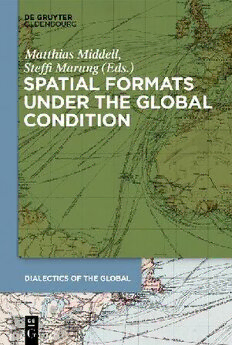
Spatial Formats Under the Global Condition PDF
Preview Spatial Formats Under the Global Condition
SpatialFormatsundertheGlobalCondition Dialectics of the Global Edited by Matthias Middell Volume 1 Spatial Formats under the Global Condition Edited by Steffi Marung/Matthias Middell FundedwithhelpoftheDFG,aproductoftheSFB1199. ISBN978-3-11-063883-7 e-ISBN(PDF)978-3-11-064300-8 e-ISBN(EPUB)978-3-11-063941-4 LibraryofCongressControlNumber:2019941360 BibliographicinformationpublishedbytheDeutscheNationalbibliothek TheDeutscheNationalbibliothekliststhispublicationintheDeutscheNationalbibliografie; detailedbibliographicdataareavailableontheInternetathttp://dnb.dnb.de. ©2019WalterdeGruyterGmbH,Berlin/Boston Typesetting:IntegraSoftwareServicesPvt.Ltd. Printingandbinding:CPIbooksGmbH,Leck Coverimage:MapoftrafficontheAtlanticOceanin1896 ©THEPALMER/gettyimages www.degruyter.com Preface Ever since the 1990s, “globalization” has been a dominant idea and, indeed, ideology.ThemetanarrativesofColdWarvictorybytheWest,theexpansionof the market economy, and the boost in productivity through internationaliza- tion, digitalization, and the increasing dominance of the finance industry be- came associated with the promise of a global trickle-down effect that would leadtogreaterprosperityforevermorepeopleworldwide.Anycriticismofthis viewpointwascounteredwiththeargumentthattherewasnoalternative;glob- alizationwastoopowerfulandthusirreversible.Today,theideologyof“global- ization” meets with growing scepticism. An era of exaggerated optimism for globalintegrationhasbeenreplacedbyaneraofdoubtandaquestforareturn to particularistic sovereignty. However, processes of global integration have not dissipated and the rejection of “globalization” as ideology has not dimin- ishedtheneedtomakesensebothoftheactuallyexistinghighlevelofinterde- pendenceandtheideologythatgavemeaningandjustificationtoit. Thefollowingthreedialecticsoftheglobalareinthefocusofthisseries: Multiplicity and Co-Presence: “Globalization” is neither a natural occurrence norasingularprocess;onthecontrary,therearecompetingprojectsofglobali- zation, which must be explained in their own right and compared in order to examinetheirlayeringandtheirinteractivecomposition. IntegrationandFragmentation:Globalprocessesresultinde-aswellasreterri- torialization. They go hand in hand with the dissolution of boundaries, while alsoproducingarespatializationoftheworld. Universalism and Particularism: Globalization projects are justified and legiti- mizedthroughuniversalclaims ofvalidity;however,atthe sametime they re- flecttheworldviewand/orinterestofparticularactors. https://doi.org/10.1515/9783110643008-201 Contents Preface V SteffiMarungandMatthiasMiddell TheRespatializationoftheWorldasoneoftheDrivingDialecticsunder theGlobalCondition 1 Part I:Concepts and Historicity MatthiasMiddell CategoryofSpatialFormats:ToWhatEnd? 15 BobJessop SpatiotemporalFixesandMultispatialMetagovernance:TheTerritory, Place,Scale,NetworkSchemeRevisited 48 JudithMiggelbrink MappingtheToolbox:AssemblageThinkingasaHeuristic 78 Part II:Territories FrankSchumacher ReclaimingTerritory:TheSpatialContoursofEmpireinUSHistory 107 JohnBreuilly ModernTerritoriality,theNation-State,andNationalism 149 Part III:Portals GeertCastryck DisentanglingtheColonialCity:SpatialSeparationsandEntanglements insideTownsandacrosstheEmpireinColonialAfricaandEurope 183 VIII Contents HolgerWeiss Hamburg,8Rothesoodstrasse:FromaGlobalSpacetoaNon-place 205 AntjeDietze VisionsoftheWorld.TransnationalConnectionsofthePanorama IndustryinLeipzigattheTurnoftheTwentiethCentury 228 Part IV: InternationalSpaces GlendaSluga TheInternationalHistoryof(International)Sovereignty 257 SteffiMarung,UweMüllerandStefanTroebst MonolithorExperiment?TheBlocasaSpatialFormat 275 UlfEngel RegionalismsandRegionalOrganizations 310 SarahRuthSippelandMichaelaBöhme Dis/ArticulatingAgri-foodSpaces:TheMultifacetedLogics ofAgro-investments 334 HannesWarnecke-Berger TheSpatialTurnandEconomics:Migration,Remittances, andTransnationalEconomicSpace 360 Authors 379 Index 382 Steffi Marungand MatthiasMiddell The Respatialization of the World as one of the Driving Dialectics under the Global Condition This volume is the result of intense collaboration among scholars from vari- ousdisciplines–geography,sociology,history,culturalstudies,politicalsci- ence,internationalstudies,andinternationalhistory–aswellasareastudies expertise–onAfrica,theAmericas,andEuropeinparticular.Furthermore,it is the outcome of various modes of translation across those disciplinary and area boundaries. The invitation to collaborate on the project was to test aconceptualvocabulary.Morethanacommonlanguage,thisvocabularyacts as a heuristic repertoire to investigate how the intensification and accelera- tionofglobalconnectednesshascausedreactionsbyvariousactorsatdiffer- ent times and in varying geographies to deal with these challenges. These reactions have essentially taken spatial forms, not only as efforts to contain, limit,andstemflowsofgoods,people,orideas–byestablishingborders,cir- cumscribing hermetic spaces of activity, preventing mobility, prohibiting access, or excluding competitors – but also as struggles to manage, redirect, profit from, fuel, and appropriate those flows – by creating networks, promoting hubs, orpushingformoreexchangetothebenefitofdiverse,oftenconflictingprojects. Accordingly,allauthorswithinthisvolumeshare anunderstandingof globaliza- tion as a dialectic of flows and controls as well as of de- and reterritorialization, essentially the result of multiple globalizationprojects,includingtheactivitiesof actorswithspecificagendas,resources,andinstrumentstopursuethem. The role of space insocial interaction has attracted rapidly growinginterest over the past decades – both in academia in particular and society in general. Thisinterestiscertainlymaintainedthroughtheperceptionthatnewtechnologies andformsofcommunication–oftenencapsulatedinthetermdigitalization–as wellasnewconfigurationsofpoliticalaffairsataglobalscale–oftensummarized underthenotionofthenewworldorder–areabouttobringnewformsandfunc- tionsofspaceintoexistence.Thishasledtoaproliferationof–oftenmetaphori- cally used – spatialsemantics, which seemtoindicatethat newphenomena are emerging. Withinthesearchforanexplanationofsuchnewspatialconfigurations,this newnessisrelatedtoandevenintegratedintothemostpowerfulnarrativeofour times:thatbeingthatglobalization isboth the driving force and the framework foramultitudeofsocietalchanges.Afteraperiodofoveroptimisticspeculations https://doi.org/10.1515/9783110643008-001
